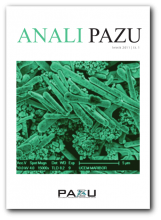Quantitative fluorescent polimerase chain reaction (QF-PCR) as an alternative test for rapid prenatal genetic testing
Abstract
Diagnosis of common chromosome aneuploidies have been successful through quantitative fluorescent PCR (QF-PCR) assays and small tandem repeats (STR) markers. Our objective was to present and to analyze the results of the first three years of a QF-PCR testing strategy for the prenatal diagnosis of common chromosome aneuploidy (trisomy of chromosome 21, 18 and 13) and to discuss about the advantages and disadvantages of methodology. Amniotic fluid or chorionic villus samples were collected from mother undergoing prenatal invasive testing for fetal abnormalities on ultrasonic examination or abnormal maternal serum aneuploidy screening results. Rapid diagnoses were performed using QF-PCR analysis with several STRs markers specific for chromosomes13, 18, 21, Y and amelogenin X/Y alleles. One QF-PCR testing consisted of six multiplexes reactions. Of the 243 samples received (amniotic cells 72.3%, chorionic villi 27.2%, placentocentesis 0.5%) 7.8% had a chromosome abnormality detected by QF-PCR testing. All cases with numerical chromosome abberations involving chromosomes 21, 18, 13 were correctly diagnosed (100%).
